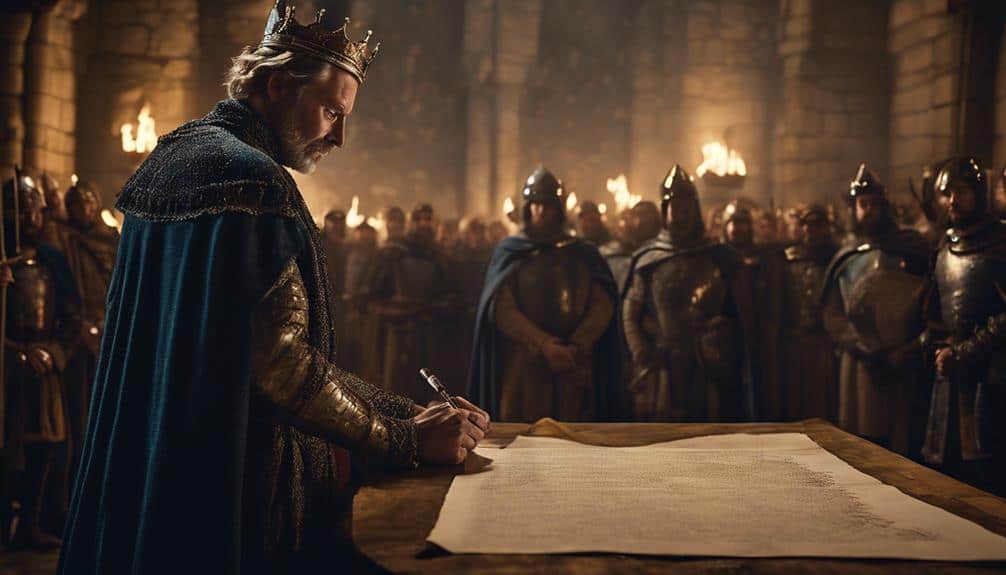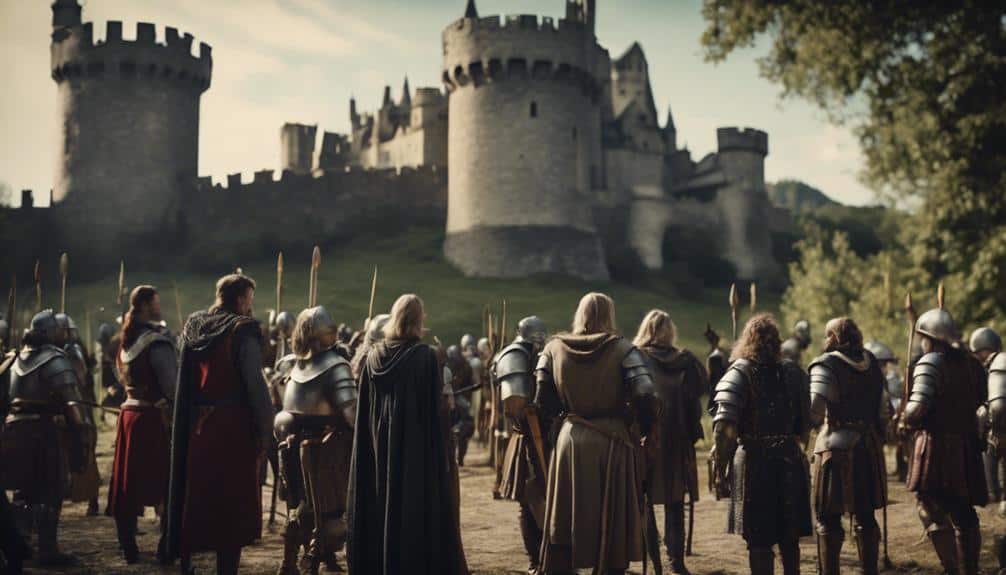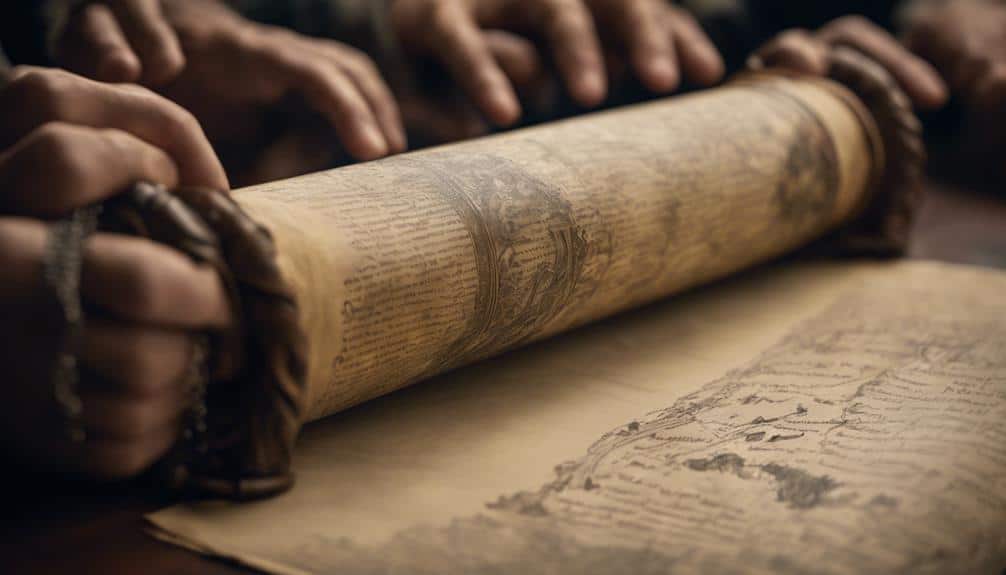Drafted in 1215, the Magna Carta emerged from a power struggle that forever altered the course of history by limiting the monarch's authority and paving the way for modern democracy.
Discover how this pivotal document's principles continue to influence legal systems and human rights frameworks across the globe.
Origins of Magna Carta

In 1215, the Magna Carta emerged from a pivotal conflict between King John and his rebel barons, who were determined to secure political concessions. The barons, frustrated with King John of England's autocratic rule, sought to limit his power. They were particularly concerned with issues such as church rights, arbitrary imprisonment, and excessive taxation. These grievances culminated in the drafting of the Magna Carta, a document that would become a cornerstone of constitutional law.
Archbishop Langton played an essential role in this process. He acted as a mediator, presenting the rebel demands to King John at Runnymede, a meadow by the River Thames, where the historic negotiation took place. The barons insisted on specific rights and protections, including swift justice and limits on the king's ability to levy taxes without consent.
The issuance of the Magna Carta marked a significant step in the struggle for the rule of law. While initially a peace treaty of sorts, it was reissued multiple times, influencing the legal and political landscape of England for centuries. The principles enshrined in the Magna Carta would later resonate in the development of constitutional frameworks, including those of early American colonists.
King John and the Barons

You can see the tension between King John and the barons as a critical turning point in medieval governance. Their rebellion wasn't just a power struggle; it aimed to curtail the king's authority and establish fundamental legal principles.
Barons' Rebellion Against Authority
The barons, frustrated by King John's oppressive rule and military failures, initiated a rebellion to demand the reaffirmation of their rights and liberties. These rebel barons were incensed by the king's abuse of power and the disastrous loss of lands in France, which weakened their position. They sought to enforce the Charter of Liberties, an earlier document promising certain freedoms, which King John had ignored.
The conflict, known as the Barons' War, culminated in the creation of Magna Carta in 1215. This pivotal document outlined basic laws and rights, including fair trials, protection for widows, and equality under the law. However, King John's resistance to these terms led to continued unrest.
Following King John's death in 1216, his young son Henry III ascended the throne. To quell the ongoing baronial discontent and establish peace, Henry III reissued Magna Carta. This reissuance was a strategic move to address the barons' concerns and stabilize the domain.
The principles enshrined in Magna Carta had a lasting impact, influencing the development of statute law in England by the end of the 13th century. These foundational laws would shape governance and legal frameworks for centuries to come.
King John's Power Limits
By agreeing to the terms of Magna Carta, King John reluctantly accepted limits on his previously unchecked authority, fundamentally altering the relationship between the monarchy and the barons. This landmark document was a direct response to the grievances of the rebel barons, who sought to curb the king's arbitrary use of power.
Magna Carta effectively set power limits by establishing rules for fair trials and swift justice, ensuring that royal authority could no longer operate without checks and balances.
The clauses within Magna Carta aimed to guarantee that King John couldn't act solely on his whims. For instance, the charter mandated that no free man could be imprisoned, exiled, or stripped of his rights without due process—a monumental step toward legal equality. Additionally, it required the king to seek the counsel of his barons before levying taxes, which diluted the centralization of royal authority.
Key Provisions

Now, let's examine the key provisions of the Magna Carta that limited royal authority and guaranteed legal protections.
You'll find that these provisions mandated fair trials, swift justice, and specific protections for individuals, including widows.
Limiting Royal Authority
Magna Carta's key provisions fundamentally reshaped the relationship between the monarchy and its subjects by explicitly limiting royal authority and establishing essential legal protections. The document made it clear that the King wasn't above the law, ensuring that the monarch had to respect the rights and liberties of his subjects.
One of the most critical provisions was the protection from arbitrary imprisonment, guaranteeing that no one could be detained without due process. This principle laid the groundwork for fair trials and underscored the importance of legal rights.
Moreover, Magna Carta introduced limitations on taxation without consent, a significant check on the King's power. By requiring the monarch to seek the approval of his council before imposing taxes, it curtailed the King's ability to levy taxes unilaterally. This move was pivotal in balancing power between the monarchy and its subjects, fostering a sense of shared governance.
Additionally, the document safeguarded widows from being forced to remarry and protected inheritances, further emphasizing the importance of personal and property rights. These provisions collectively marked a profound shift in power dynamics, embedding legal constraints on royal authority and ensuring a foundation for an accountable and just legal system.
Ensuring Legal Protections
Building on the limitations imposed on royal authority, the document secured legal protections by guaranteeing swift justice, fair trials, and the safeguarding of widows' rights. Magna Carta's provisions established equality under the law for all men, including the king, creating a precedent that shaped the British legal system and emphasized individual liberties.
The document's key provisions laid the groundwork for modern legal practices, ensuring due process and fairness in the judicial system. These principles were instrumental in establishing a peace treaty after the Barons' War, demonstrating Magna Carta's role in legal and political agreements. The influence of its provisions can still be seen today, reflecting in the roots of the British legal system and beyond.
Key legal protections provided by Magna Carta include:
- Swift Justice: Ensuring timely and efficient resolution of legal disputes.
- Fair Trials: Guaranteeing impartial and just hearings for all individuals.
- Protection of Widows: Safeguarding the rights and properties of widowed women.
- Equality Under the Law: Applying the same legal standards to everyone, including the monarch.
Immediate Impact

The immediate impact of Magna Carta in 1215 was profound, as it directly addressed the grievances of the barons and established a precedent for legal accountability and individual rights. By forcing King John to sign the document, the barons sought to curtail his arbitrary authority and bring about a more equitable system of governance. However, the initial effect wasn't entirely peaceful. The First Barons War erupted shortly after, as King John reneged on his commitments, leading to a period of civil unrest.
Pope Innocent III's annulment of the Magna Carta only exacerbated tensions. Despite this, the document's principles endured. When King John died in 1216, a revised version of Magna Carta was issued by his successor, Henry III, to restore peace and legitimize his rule. This reissuance marked the beginning of Magna Carta's slow but steady integration into English law.
The civil war and subsequent issuance highlight the document's immediate influence in shaping political dynamics.
Today, Magna Carta remains a cornerstone of legal history, with original copies preserved in the National Archives, reminding us of its enduring legacy in promoting justice and accountability.
Reissuance and Reaffirmation

King John's death in 1216 set the stage for the regency government and later Henry III to reissue Magna Carta, emphasizing its foundational role in the evolving legal landscape.
The charter's reissuance in 1216 and 1225 under Henry III underscored its importance in maintaining peace and establishing a legal framework. By reaffirming Magna Carta, these rulers sought to solidify its principles within the kingdom's governance.
Edward I's confirmation of Magna Carta as part of England's statute law in 1297 further solidified its legal status. This move secured that its provisions became binding legal precedents, integral to the country's judicial system. Edward I's actions highlighted the long-term importance of the charter, demonstrating its enduring influence on legal and political developments.
Key points to keep in mind:
- Magna Carta's reissuance by multiple monarchs reinforced its importance.
- The reaffirmation by Edward I in 1297 elevated it to statute law, enhancing its legal status.
- Despite most clauses being repealed, four still have force in England and Wales.
- Magna Carta profoundly influenced the United States Constitution, shaping foundational democratic principles.
The reissuance and reaffirmation of Magna Carta showcased its lasting impact and the evolving nature of legal and political frameworks.
Long-Term Influence

Over the centuries, Magna Carta's principles have profoundly shaped modern legal systems, guaranteeing equality, fair trials, and swift justice for all. Its influence is most prominently seen in the foundation of the British legal system, where its core tenets have been integrated into contemporary legal practices. Magna Carta established the idea that no one, not even the king, is above the law, a principle that continues to underpin modern legal frameworks.
By advocating for fair trials, Magna Carta set a precedent for legal processes that prevent arbitrary imprisonment and ensure that judgments are made based on established laws. This emphasis on equality before the law has been crucial in promoting justice and safeguarding individual rights within the British legal system and beyond.
Moreover, Magna Carta's principles have extended to the resolution of conflicts, as demonstrated by its role in peace treaties, including those following the Barons' War. Its influence didn't stop at British shores; explorers carried these ideals to new colonies, embedding them in the legal systems of emerging nations.
This foundational document has therefore shaped contemporary legal practices, guaranteeing that the principles of equality, fair trials, and swift justice remain central to modern legal systems.
Global Legacy

Magna Carta's principles didn't just revolutionize the British legal system; they also laid the groundwork for legal frameworks across the globe, including the United States Constitution and other democratic charters. This 13th-century document is often celebrated for its enduring global legacy, influencing the establishment of human rights and individual liberties worldwide.
The Magna Carta's global influence is evident in several key ways:
- United States Constitution: Many of its principles, such as due process and the right to a fair trial, were directly incorporated.
- Human Rights Charters: The Universal Declaration of Human Rights echoes its call for equality and justice.
- Common Law Systems: Countries like Canada, Australia, and India have legal systems that reflect its foundational ideals.
- International Law: Its emphasis on limiting government power and ensuring individual rights has shaped global legal standards.
Modern Interpretations

In today's world, scholars and legal experts continue to analyze how the principles enshrined in Magna Carta remain relevant to contemporary issues of governance and individual rights. They underscore the document's enduring impact on legal and political systems worldwide.
The British Library often hosts exhibitions that explore these modern interpretations, emphasizing how the principles of equality, justice, and limited government continue to shape today's legal frameworks and constitutional laws.
Stephen Langton's role in the creation of the revised version of Magna Carta highlights its adaptability and enduring significance. Modern interpretations focus on how these historical adjustments have paved the way for new political ideologies and practices.
In political life today, Magna Carta serves as a foundational text, promoting democratic ideals and the rule of law.
Countries and organizations commemorate Magna Carta's legacy through various educational programs and events, ensuring its principles aren't forgotten. By examining how Magna Carta's core tenets apply to modern governance and individual rights, you gain a deeper understanding of its role in shaping contemporary political life.
This analysis highlights Magna Carta's timeless relevance and its ongoing influence on global legal and political systems.


